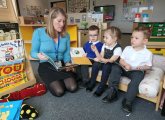Prioritising oral language skills in the early years helps to remove the barriers to later success, says Prof. Charles Hulme…
Oral language is the heart of literacy and learning. It’s fundamental for reading, comprehension, communication, and social development.
Children’s language skills develop rapidly between the ages of three and six, making the early years a crucial period. Yet, despite the significant attention given to phonics and literacy more generally, oral language often remains overlooked.
Researchers estimate that approximately one in five children are behind in their speaking and understanding of words, the largest ever recorded.
Language difficulties can have a cumulative effect throughout a person’s life. Pupils with poor language skills are, as adults, more likely to receive fewer qualifications, have lower incomes and reduced employment opportunities, and suffer from mental health problems.
The good news is that, if we identify it early, we can ameliorate delays in oral language development.
Good oral language skills are the foundation of school life, enabling pupils to participate fully in lessons and classroom activities.
They’re also critical for social and emotional development – how can children play with their friends if they can’t join in the conversation?
Critically, oral language skills are essential in learning to read. The Simple View of Reading, a model referenced in the DfE Reading Framework, states that to understand what you are reading you need two skills: decoding and language comprehension.
Decoding – or translating written words into speech – while crucial, won’t get you very far without a solid grasp of language.
You can know how to pronounce every word, but if you don’t understand the meaning of what you are reading, the whole point is lost.
However, research takes this model further by showing that language underpins the whole process of learning to read.
Oral language is not just essential for reading comprehension but also underpins the development of foundational decoding skills – phoneme awareness and letter knowledge.
This expanded model comes from a long-term research study that followed three groups of children from three to eight years, including those with preschool language delay, those with a dyslexic family member and a control group.
The study found that language skills at three and a half years strongly predicted children’s prereading skills at school entry, which in turn predicted how well they could read words at the end of their first year in school.
In other words, early language skills are strongly related to how well children will learn to read words once they enter school.
Furthermore, these early language skills were also strongly related to children’s understanding of what they read at age eight.
Looking at each group at age eight, seven per cent of the control group had reading difficulties (which is about what we would expect in the general population) and 26% of those with a dyslexic family member had reading difficulties.
But, perhaps most surprisingly, 66% of children with poor language skills at three and a half had poor reading skills aged eight. This striking finding highlights just how important focusing on oral language development is in the early years.
Language skills develop very rapidly between the ages of three to six years, so it may not be immediately obvious which children have language delays.
Implementing a universal, standardised screening programme provides a baseline against which educators can measure children’s language development over the year. It ensures that we don’t overlook those with language delays.
When looking for an assessment, settings should look for those that are objective, standardised and research-backed.
An objective test means anyone can administer it effectively, for example, through the assessment providing clear yes/no, correct/incorrect rules.
A standardised assessment requires a large dataset; the bigger the dataset, the more accurate and reliable an assessment is, so you can be confident in its accuracy. And again, if the assessment is backed by research, its outcomes will be more credible.
To foster oral language development, early years settings should create a language-rich environment. Modelling effective communication by narrating actions, incorporating storytelling and singing, and providing opportunities for role-play provides diverse contexts for pupils to experience and practise language.
Encourage children to speak, and provide them with supportive feedback when they do, sometimes expanding what a child says to you.
Consider also adding copies of books you are using in work with children to your reading corner or labelling key vocabulary on activity stations to encourage children to make connections between spoken and written language.
LanguageScreen, developed by OxEd & Assessment, emerged from decades of research at the University of Oxford to meet the need for a quick, reliable, and school-based oral language assessment.
It evaluates four key areas: expressive vocabulary, listening comprehension, receptive vocabulary, and sentence repetition.
Built upon a dataset of over 600,000 assessments (and growing), LanguageScreen enables nurseries and primary schools to assess each child in less than ten minutes, providing automated scoring and clear reporting to support decision-making.
LanguageScreen quickly and accurately identifies children with language delays and makes educators aware of the range of language abilities present among the children they are teaching.
Effective, evidence-based interventions, such as the NELI Intervention and NELI Preschool, should also be a key part of the early years toolkit.
Interventions like these provide an intensive focus on building oral language skills, without which, those with the weakest skills are unlikely to be able to catch up with their peers.
The NELI Intervention, for children in Reception, has been shown through randomised controlled trials and rigorous independent evaluations to help children make up to seven months’ additional progress in their oral language skills.
More importantly, this progress is shown to last – with children still showing improvements two years after the intervention has taken place.
Such durable results from an intervention are very unusual. Recognising the importance of a holistic approach to oral language, NELI Whole Class complements the NELI intervention, following the same six topics, and its intensive focus on active listening, vocabulary and narrative skills.
It supports schools, through a flexible bank of activities, to help all children build strong oral language skills while further boosting the skills of those receiving the intervention.
NELI Preschool is a new language enrichment programme designed specifically for preschool settings, built around shared book reading and guided play.
A randomised controlled trial led by the University of Oxford showed that NELI Preschool significantly boosts the language skills of children, with those who participate making the equivalent of three months’ additional progress. This results in a stronger language foundation and children being better prepared for school entry.
Professor Charles Hulme is founder of OxEd & Assessment.

Reflective practice – How to use it in Early Years
Editors picks

Keep SLC on top of the agenda
Editors picks
